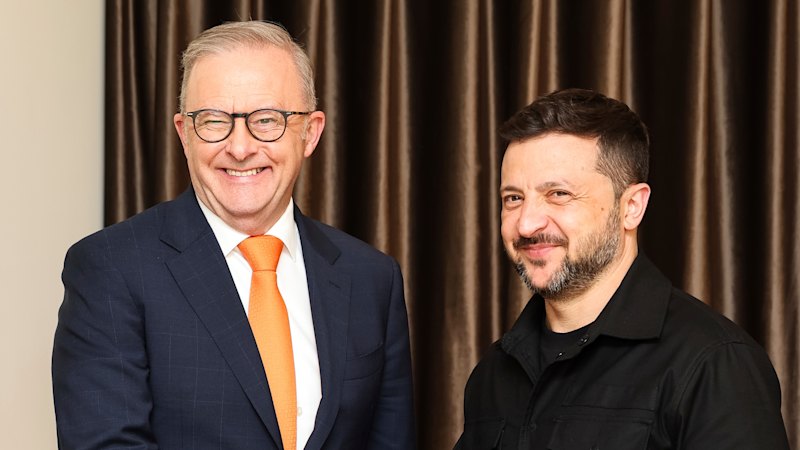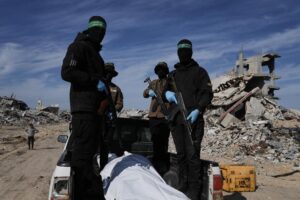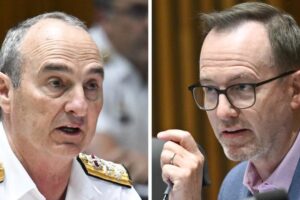
The Pentagon has extended a contentious review of the AUKUS pact and appears unlikely to deliver any findings until the end of the year, dragging out the doubts about the Trump administration’s position on the pact.
Starmer and his ministers have stepped up their support for the agreement, most recently when Defence Secretary John Healey signed an AUKUS treaty with Deputy Prime Minister and Defence Minister Richard Marles in Geelong last month.
Loading
Macron is expected to meet Ukrainian President Volodymyr Zelensky in Paris ahead of the meeting of the “coalition of the willing” on Thursday, local time.
The leadership summit comes as the Australian Defence Force Chief of Joint Operations, Vice Admiral Justin Jones, meets his European counterparts this week to discuss military assistance, including air surveillance, training and tanks.
The Defence chief arrived in London on Tuesday, local time, and confirmed that Australian military planners were part of the discussions with NATO defence officials about operational support for any decisions taken at the coalition summit.
“We’re involved in the planning, and we will wait until there is a peace deal of some sort, and then wait for our government’s direction on how it wants to handle it,” he told reporters in London.
Albanese was an early supporter of the coalition when Macron and Starmer formed the group at the start of this year, although he made no specific military commitment and instead said he would consider the options for support.
The initiative sparked a domestic political row when then-Liberal leader Peter Dutton said that basing troops in Europe was the wrong decision for Australia. Albanese has not promised Australian troops to Ukraine, but the Australian Defence Force has personnel in Europe assisting Ukraine.
Australia has delivered $1.5 billion in military and humanitarian aid to Ukraine since Russia launched its full-scale invasion in February 2022, including a Royal Australian Air Force E-7A Wedgetail aircraft that began surveillance flights last month.
Macron announced the Thursday summit at the start of this week, in a sign of the urgent moves among European leaders to show support for Ukraine, in the hope that Trump would apply more pressure on Putin to agree to a peace deal.
Loading
“Together with our partners, and in coordination with NATO, we will work to define robust security guarantees for Ukraine,” Macron said.
“We will also review Russia’s stance, as it persists in its war of aggression and continues to reject peace.”
Recent meetings of the coalition have included leaders from outside Europe, including Canadian Prime Minister Mark Carney, Japanese Prime Minister Shigeru Ishiba and Albanese. An Australian government source confirmed Albanese would join this week’s meeting and also confirmed that planning was underway for the visit to the UK, although details were not finalised.
NATO Secretary General Mark Rutte said on Tuesday that Ukraine needed “unbreakable backing” from allies to ensure that Russia would honour any peace deal and not threaten Ukrainian territory again after a deal.
Jones said defence officials had been involved in the coalition since it began early this year and had deployed planners from Defence headquarters, along with military staff from the Australian High Commission in London.
“In the normal way of prudent planning, we would have a range of options from which the government can choose, and I’m not going to disclose that before the government has had a chance to consider those options.”
Jones, who commanded several warships before being elevated to Chief of Joint Operations last year, would not comment on whether he believed more military help should be sent to Ukraine because he said this was a decision for political leaders.
He said Ukraine had received most of the Abrams tanks Australia promised last year, and he acknowledged that the Bushmaster armoured vehicles were a “great capability” but would not say if more should be sent.
“There’s not a military commander on earth that will tell you that they have enough. That’s the nature of the role, and they’ll always want more,” he said.
“I’m very proud of the work that we are doing in support of Ukraine, from a small, far away nation that still has an eye on a rules-based global order, and is frankly appalled by Russia’s aggression – by its illegal, immoral, unjust, unnecessary invasion of a sovereign country.”
Get a note directly from our foreign correspondents on what’s making headlines around the world. Sign up for our weekly What in the World newsletter.





